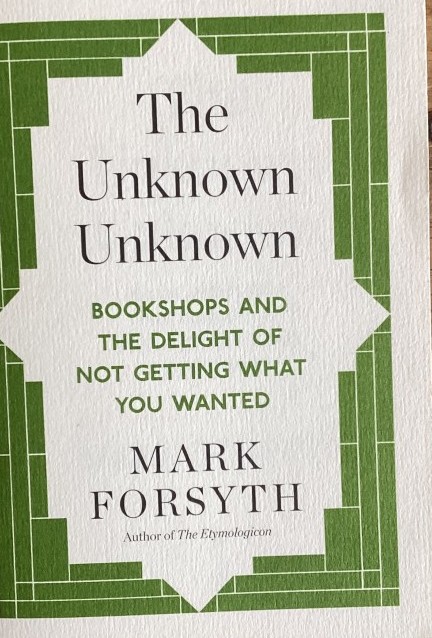Inspiring Older Readers
 posted on 05 Aug 2025
posted on 05 Aug 2025
The Unknown Unknown by Mark Forsyth
I can’t quite remember when I first noticed that bookshops had started to position small, essay-length paperbacks that could easily be slipped into a pocket and which would be readable in the odd hour – maybe when travelling or sitting and having a coffee – by the till as you paid for your more substantial purchase. They were/are usually eye-catching titles and very often relate to books, reading, bookselling or some related field and cost the equivalent of adult pocket-money.
This little 25 page offering from Icon Books has been written by Mark Forsyth who is perhaps best known for his series of books that explore the pleasures of etymology - The Etymologicon, The Horologicon, and The Elements of Eloquence. But in this little squib, Forsyth considers the indispensable role of bookshops in giving readers the chance to discover the ‘unknown unknowns’ that maybe tucked away on their shelves just waiting for you to turn up.
It's in the nature of these ‘till books’ to not be too taxing or po-faced and that is certainly the case here – despite the fact that it has at its heart the important issue of the role of books and bookshops in the digital age. Forsyth’s style is light-hearted, self-deprecating and pleasingly elliptical. His starting point, as some of you will have spotted from the pamphlet’s title, is that infamous speech by the American politician, Donald Rumsfeld. The speech he made contained the following statement:
“Reports that say that something hasn't happened are always interesting to me, because as we know, there are known knowns; there are things we know we know. We also know there are known unknowns; that is to say we know there are some things we do not know. But there are also unknown unknowns—the ones we don't know we don't know. And if one looks throughout the history of our country and other free countries, it is the latter category that tends to be the difficult ones.”
This was jumped on by many commentators as an example of the way politicians lose touch with ‘ordinariness’ and slip into indigestible gobble-de-gook and, as a result, the quote has rather followed him around as a symbol of the political tin-ear. But, and you won’t get me to say this about anything else Rumsfeld did or said, I think he got a very unfair rap in this case – what he said, if read properly, is entirely correct. There are certainly unknown unknowns that are just waiting to surprise us all – things we don’t know we don’t know.
And this, Forsyth spells out for us is the true beauty of the bookshop. Yes, technology and the internet helps you get what you want and can do it on a world-wide scale – BUT – only if you know what you want and where to go for it. What you can’t do online is browse and expect to find something you’ve never heard of. Online you can’t pick up a book, flick through a few pages, sniff it, get a sense of its heft, admire its aesthetics. That can only happen in a physical shop of some kind. And that’s why bookshops need to continue to exist – to allow you to meet the unknown unknowns.
Now that’s not, I know, a new argument and I wouldn’t claim that this little essay tells you anything new. What it does do however is to tell you this in a clubbable, hail-fellow-well-met sort of way that will lighten a journey, give you something to read in one of those outrageously expensive coffee stops you stop in or provide you with a good natured late-night read before lights-out.
If you keep your eyes open in charity shops or the like, there’s a good chance you’ll pick up a copy of this for no more than the 50p I spent on it. What have you got to lose?
Terry Potter
August 2025